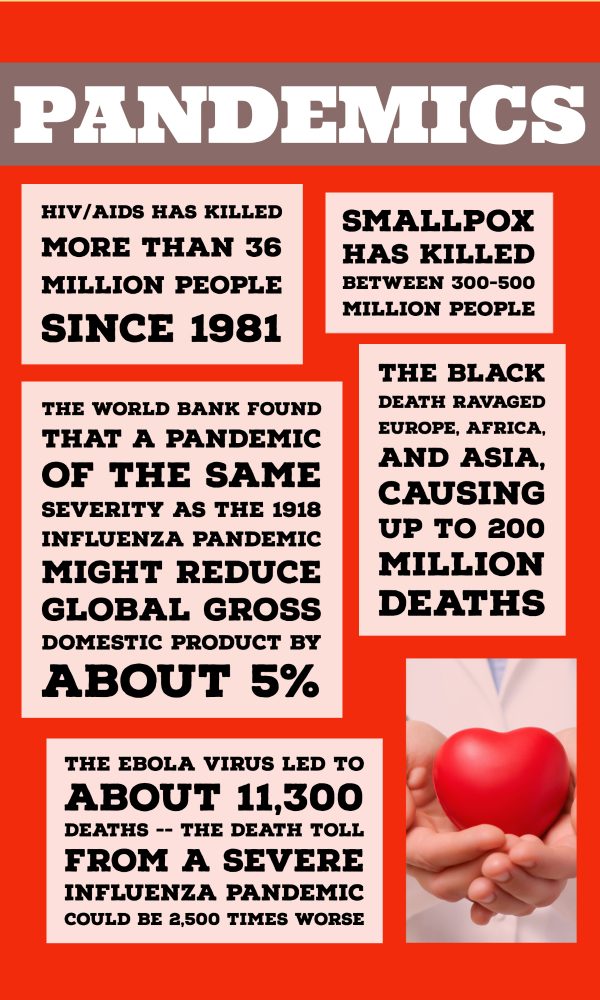What You Need to Know About Pandemics - Legacy ER
- Category: COVID-19
- Posted On:
- Written By: David Apple
The World Health Organization (WHO) has declared the coronavirus outbreak a pandemic.
But what does this mean? What exactly is a pandemic?
An epidemic is defined as an outbreak of a disease that occurs over a wide geographic area and affects an exceptionally high proportion of the population. A pandemic relates more to the geographic spread and is used to describe a disease that impacts a whole country or the entire world.
An epidemic means that a disease is actively spreading, often growing out of control. Pandemic relates more to the pattern and speed by which the disease moves — its reproduction rate — as well as the size of the critical community — its susceptible population.
Viruses can infect millions — sometimes billions — of people across the globe and need to be taken seriously. Pandemics, no matter their severity, can lead to all sorts of global issues, including supply chains slowing, businesses and schools closing, travel restrictions, weakened economies, misinformation, confusion, and panic.
How Are Pandemics Phased?
Take, for example, the influenza pandemic in 2005:
- Phase 1 — The period during which no animal viruses are reported to cause infection in humans.
- Phase 2 — First level of threat where a virus is confirmed to have moved from an animal to a human.
- Phase 3 — When sporadic cases of the disease are confirmed, but no human-to-human transmission has occurred.
- Phase 4 — The point where human-to-human transmission has caused a community-wide outbreak.
- Phase 5 — When human-to-human transmission of the disease has reached at least two countries.
- Phase 6 — The point at which the virus is officially declared a pandemic.
Additionally, there is the post-pandemic phase, which occurs after the disease-spreading activity begins to dwindle. Typically, it takes several months for a virus to pass through all six stages.

What Can Be Done?
Thankfully, there are real, actionable things that you can do in order to soften the impact a pandemic might have on your life:
- Remain Calm — Pandemic, virus, disease, etc. All of these terms can be nerve-wracking — but it’s imperative to remain calm during these times. Panicking can only lead to more chaos and confusion. No matter what, take a deep breath and do your best to think clearly.
- Stay Informed — Unfortunately, there are far too many illegitimate sources out there spreading lies — constantly. Do your best to stay informed by reliable, fact-based, and accurate information.
- Stock Up On Essentials — You don’t have to buy your local grocery store out of toilet paper, but you should purchase a few extra essentials so you don’t have to continually make trips to the store. Get enough good, water, medication, and cleaning supplies for at least two weeks.
- Follow Health Officials’ Instructions — Beware of isolation or quarantine protocols, travel notices, and any other update made by (legitimate) health officials.
- Learn the Signs of the Virus — It’s imperative that you and your family know what to look for during a pandemic. NOTE: the signs and symptoms of the coronavirus are fever, cough, and trouble breathing.
- Practice Preventive Measures — Though you should always do these things, they should be prioritized during a pandemic: wash your hands, avoid touching your face, avoid close contact with people who are sick, cover your coughs and sneezes, get enough sleep, avoid crowded spaces, eat healthy foods, and stay up to date on recommended vaccines.
Again, it’s important to never panic during any stage of a pandemic. Instead, take care of yourself and your loved ones, pay attention and listen to health officials, and be careful with who and what you’re coming in contact with. If you or a loved one is struggling with any kind of severe health issue, visit a 24-hour emergency center right away.
